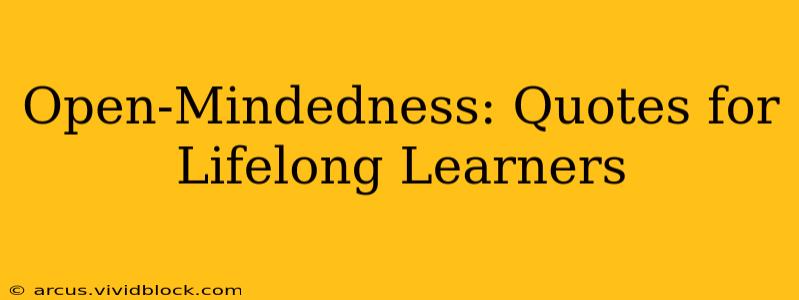Open-mindedness—the willingness to consider new ideas, perspectives, and evidence—is the cornerstone of lifelong learning. It's the essential ingredient that allows us to grow, adapt, and evolve throughout our lives. This isn't simply about absorbing information; it's about actively engaging with the world, challenging our assumptions, and embracing the unknown. This article explores the importance of open-mindedness, particularly for lifelong learners, through insightful quotes and practical applications. We'll delve into what open-mindedness truly means and how cultivating it can enrich our lives.
What Does Open-Mindedness Mean?
Open-mindedness isn't about blindly accepting everything you hear; rather, it's about approaching new information with curiosity and a willingness to evaluate it critically. It involves acknowledging that your own beliefs might be incomplete or even incorrect and being prepared to adjust them in light of new evidence. It's about embracing intellectual humility, recognizing the limits of your own knowledge, and valuing diverse viewpoints. It's a crucial skill for navigating the complexities of the modern world and fostering meaningful connections with others.
The Importance of Open-Mindedness for Lifelong Learners
For those committed to lifelong learning, open-mindedness isn't just beneficial—it's essential. The pursuit of knowledge inherently involves encountering new ideas and perspectives that may challenge your existing understanding. Without an open mind, you risk stagnating intellectually, clinging to outdated beliefs, and missing out on valuable opportunities for growth. Open-mindedness allows you to:
- Embrace new challenges: Stepping outside your comfort zone and exploring unfamiliar territories requires an open mind.
- Learn from mistakes: Open-minded individuals are more likely to analyze their errors, learn from them, and adapt their approach.
- Develop critical thinking skills: Openness to diverse perspectives helps you analyze information objectively and develop stronger critical thinking skills.
- Foster collaboration: Open-mindedness is vital for effective teamwork and collaboration, allowing for the exchange of ideas and perspectives.
- Increase empathy and understanding: By considering different viewpoints, you develop greater empathy and understanding of others.
Quotes that Inspire Open-Mindedness
Many insightful thinkers have highlighted the importance of open-mindedness. Here are a few quotes that encapsulate the spirit of intellectual curiosity and the value of embracing new perspectives:
-
"The mind is not a vessel to be filled, but a fire to be kindled." – Plutarch: This quote beautifully illustrates the active and dynamic nature of learning and the importance of engaging with knowledge rather than passively receiving it.
-
"The only true wisdom is in knowing you know nothing." – Socrates: This highlights the importance of intellectual humility, recognizing the limits of your own knowledge, and remaining open to learning.
-
"It is the mark of an educated mind to be able to entertain a thought without accepting it." – Aristotle: This emphasizes the importance of critical thinking and evaluating information objectively, rather than simply accepting it at face value.
-
"Learn from the mistakes of others. You can't live long enough to make them all yourself." – Anonymous: This quote underscores the importance of learning from others' experiences and the value of an open mind in accepting diverse viewpoints.
How to Cultivate Open-Mindedness
Developing open-mindedness is a continuous process, not a destination. Here are some practical steps you can take to cultivate a more open mind:
-
Actively seek out diverse perspectives: Read books and articles from various authors, listen to podcasts with different viewpoints, and engage in conversations with people from different backgrounds.
-
Challenge your own assumptions: Regularly examine your own beliefs and biases. Ask yourself why you believe what you believe, and be open to revising those beliefs if new evidence emerges.
-
Practice active listening: Pay close attention to what others are saying, even if you disagree with them. Try to understand their perspective before responding.
-
Embrace intellectual humility: Acknowledge that you don't know everything and that there's always more to learn. Be open to being wrong and willing to change your mind.
-
Cultivate curiosity: Ask questions, explore new topics, and always seek to expand your understanding of the world.
Is Open-Mindedness Always a Good Thing?
While open-mindedness is generally positive, it's crucial to recognize that it should be balanced with critical thinking. Being open to new ideas doesn't mean accepting everything uncritically. It's vital to evaluate information objectively, consider the source's credibility, and assess the evidence supporting a claim. Open-mindedness should be coupled with discernment and a healthy dose of skepticism.
Frequently Asked Questions
How can I improve my critical thinking skills to accompany my open-mindedness?
Improving critical thinking complements open-mindedness. Practice evaluating information sources, identifying biases, and analyzing arguments logically. Learn to distinguish fact from opinion and identify fallacies in reasoning. Engage in respectful debates to sharpen your analytical skills.
What are some common obstacles to open-mindedness?
Cognitive biases, confirmation bias (seeking information that confirms existing beliefs), emotional attachments to certain beliefs, and fear of being wrong are significant obstacles. Self-reflection and conscious effort are needed to overcome these.
How can open-mindedness improve my relationships?
Open-mindedness fosters empathy and understanding, creating stronger and more meaningful relationships. Actively listening to different viewpoints and acknowledging their validity improves communication and reduces conflict.
By embracing open-mindedness, lifelong learners unlock their full potential, fostering intellectual growth, deeper understanding, and richer relationships. It's a journey of continuous self-improvement, fueled by curiosity and a commitment to lifelong learning.

